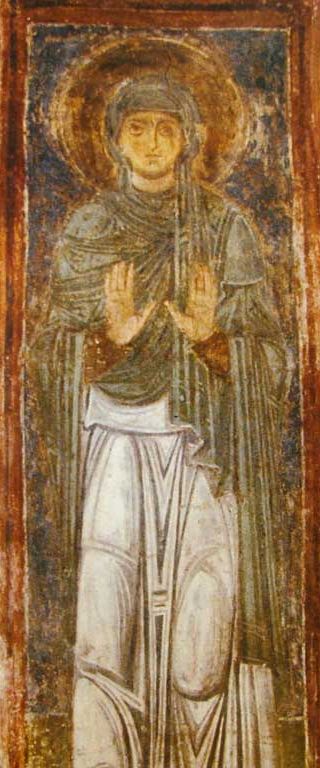(Macrena the Younger, from a fresco in St. Sophia Cathedral in Kiev, courtesy of Wikimedia Commons)
Readings for the feast day of Macrena the Younger, Friday, July 19, 2019:
I had to chuckle when I started my research for today’s essay–I googled “Macrena” and got videos and step-by-step instructions on how to dance the Macarena. So it’s safe to say that she’s not a saint that is in the forefront of the Google collective mind.
In some ways, I suppose it’s partly because she belongs to one of those categories of female saints who historically were lauded because they were lifelong virgins. We’re not sure what to do with that these days, in a world where we struggle to define women independently of their reproductive organs.
What we need to consider, however, is how in her day, it was a huge pushback against traditional gender roles. Macrena, named after grandmother, (that’s why she’s called Macrena the Younger), in many ways seemed destined to live a life of obscurity. By age 12, as was the custom, her father arranged a marriage for her to a man from a good family–but he died before the nuptials could take place. Macrena loved learning (from accounts, she was a person with a fairly extensive knowledge of the Bible), and she figured out pretty quickly that a wife’s life in those days didn’t leave much time for that. Instead, she announced her decision to consider herself eternally betrothed to Christ, and embarked on a life of prayer and study.
The road still wasn’t easy, though. After the death of her father, she and her mother founded a community of women who also saw themselves drawn to an ascetic life of prayer and study. It was notable enough to garner the attention of Gregory of Nazianzus, and Eustathius of Sebaste, who loaned their patronage to the venture. Upon the death of her mother, on top of all that, she had primary responsibility for the rearing of her ten younger brothers. Her brother Peter, helped her turn her family’s estate into a monastery and convent. You might recognize two of her brothers–Gregory of Nyssa and Basil the Great. She was clearly an influence in their lives. Three of her brothers (Basil, Gregory, Peter) became bishops.
Macrena’s community was well known for their generous and, at the time, radical hospitality. For instance, in those days it was not unusual during a drought, for families to simply abandon their children. Macrena and her brother Peter scoured the countryside for those children and took them in to their monastic communities.
It was Macrena’s conscious choice to live a life defiant of the social gender norms of the time that was ultimately her strength to not only pursue a life with her own ministry, but form the building up of the ministries of her brothers.
When is a time you found yourself pushing society’s norms, simply because you knew in your heart it was what you were called to do?
Maria Evans splits her week between being a pathologist and laboratory director in Kirksville, MO, and gratefully serving in the Episcopal Diocese of Missouri , as the Interim Pastor at Christ Episcopal Church, Rolla, MO.

